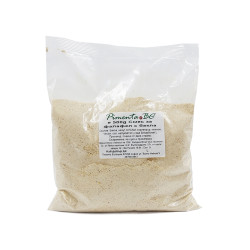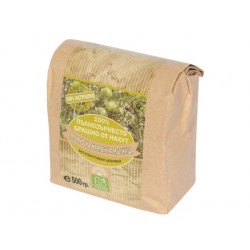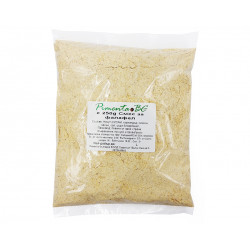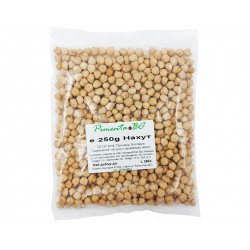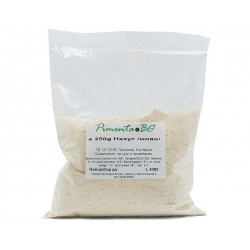Chickpea (Cicer arietinum) is an annual plant from the Fabaceae family. It is believed to be one of the earliest legumes cultivated by man. His homeland is considered to be the lands of the Mediterranean, most likely those of Asia Minor. Archaeological finds testify that the local population used chickpeas as a staple food more than 7,500 years ago. In ancient times, it was extremely popular in Greece, Rome and Egypt.
Over the millennia, culinary traditions related to chickpeas deepened and developed mainly in the countries of the Mediterranean basin (North Africa, the Middle East, Italy, Spain and southern France), where today a huge number of its incarnations are known.
Hummus is especially revered in Arab countries - a paste containing boiled chickpeas, tahini, olive oil, garlic and a wide variety of spices. For example, in the recipe of the so-called sultana hummus they are as many as forty. Falafels also have many fans. In Burma, chickpea cheese is popular, which is produced in a similar way as soy cheese, called tofu.
Significant amounts of more than 80 valuable nutrients for the human body have been found in chickpeas!
In particular, it is the holder of a double record, which, according to the authoritative opinion of a number of specialist nutritionists, ranks it among the ten most useful foods on the planet. On the one hand, chickpeas have a high content of carbohydrates - mono- and disaccharides (3%) and starch (43.2%), and on the other hand, like other legumes, they are rich in easily digestible proteins (20.1%). . A curious fact is that part of the starch (about 15%) represents the so-called resistant starch, which is not digested by the digestive tract and reaches the large intestine unhindered. It has been established that there it contributes to the increase of the population of beneficial bifidobacteria, which suppress the development of pathogenic microflora, have a protective effect against the development of colon cancer and improve the immune defense of the body.
Chickpeas belong to the foods with a low glycemic index - 30. Moreover, there are reports that it helps to regulate the glucose content in the blood.
In terms of quality, the proteins of chickpeas come close to that of eggs, which are a recognized standard. Eight essential amino acids (which the body cannot synthesize) were found in them - lysine, leucine, isoleucine, methionine, phenylalanine, threonine, tryptophan and valine. According to the content of two of them - methionine and tryptophan, chickpea is the leader among legumes. Methionine plays extremely many roles in the human body, among which one of the most important is the synthesis of the magical amino acid L-carnitine. The latter serves as a transporter of fatty acids through the cell membranes to the mitochondria - the cellular energy "factories", where the accumulators of vital energy - adenosine triphosphoric acid (ATP) molecules, without which life processes in the human body are impossible, are produced.
According to recent research, methionine significantly lowers the risk of developing pancreatic cancer.
Tryptophan is a precursor (starting substance) from which the body synthesizes the important neurotransmitter serotonin, which regulates mood, sleep, appetite, body temperature, sexuality, etc. In the liver, tryptophan is converted into niacin (vitamin B3), which contributes to the proper functioning of the nervous and digestive systems, the skin, the production of some sex hormones, etc. The lipid content of chickpeas is lower than that of nuts such as peanuts and walnuts and varies from 4 to 8%, among which those derived from unsaturated fatty acids predominate. Chickpeas, like soybeans, are an important source of lecithin, which is known to help lower blood cholesterol levels, strengthen the heart muscle, "sanitize" the walls of blood vessels, etc. In chickpeas, the so-called isoflavones - non-steroidal phytoestrogens, which are an effective means of counteracting the climacteric syndrome in women (osteoporosis, hot flashes, sweating). They have antioxidant and anticarcinogenic effects and have a beneficial effect on the cardiovascular system and skin condition.
Chickpeas contain a number of important vitamins - beta carotene (provitamin A), B1, B2, B3, B4, B5, B6, B9, C, E and K, as well as an impressive set of minerals valuable for the human body - sodium, potassium, calcium, magnesium, iron, nickel, cobalt, copper, zinc, manganese, molybdenum, titanium, selenium, boron, chlorine, phosphorus, sulfur, silicon, etc. It is worth noting the high content of zinc in chickpeas (2.4 mg/100 g), an element that plays important roles in the human body. It helps to assimilate and store the insulin synthesized by the pancreas, strengthens the immune defense and accelerates the healing of wounds, participates in metabolizing proteins and takes an active part in the overall development of the body. The fiber content of chickpeas is high (up to 9.2%), which automatically ranks it among the most valuable foods for the digestive system. According to the recommendations of the American Academy of Sciences, men up to the age of 50 should consume 38 g of fiber per day, and women - 25 g. For older people, the norms are 30 g and 21 g, respectively.
Thanks to the unique combination of a huge number of biologically active substances, chickpeas help to reduce the level of cholesterol and blood pressure and have a beneficial effect on the functions and condition of the prostate. In the case of disturbances in the digestive tract (for example, diarrhea), boiled chickpeas are an extremely good remedy. There is convincing evidence that it acts preventively and curatively in relation to such annoying hemorrhoids.
Where to buy chickpeas?
You can find chickpeas products such as dry herb, capsules, tincture, etc in "Zdravnitza".
You can place your order online. We deliver our products to products in Bulgaria, Europe, USA, Canada, Australia, Israel and Thailand.
You can also buy chickpeas products and cosmetics on the local stores of "Zdravnitza"
Health store "Zdravnitza"
1000 Sofia, Bulgaria
23 Neofit Rilski str.
Health store "Zdravnitza"
1303 Sofia, Bulgaria
74 Odrin str.




